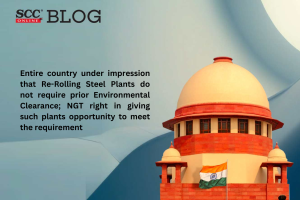Supreme Court: In an appeal regarding the jurisdiction of National Green Tribunal’s (NGT) to pass an order to operate a unit without Environmental Clearance and against the decision of closure of the unit, the bench of Hemant Gupta* and Vikram Nath, JJ. has observed that there was no error in the order passed by the Tribunal that opportunity should be provided to re-rolling or cold rolling units to fall within Environmental Clearance (EC) regime by granting a period of at least one year to operate for the purpose. However, the order of closure of the unit cannot be sustained.
The Court noted that an application was filed before the Tribunal on 20.7.2019 on the ground that the Project Proponent has set up the unit in violation of Environment Impact Assessment (EIA) notification as such plant would fall within category 3(a) i.e., secondary metallurgical industry, for which prior environmental clearance is required. The Tribunal took a prima facie view that the industry requires environmental clearance and thus stayed all activities of the project. The Expert Appraisal Committee (EAC) recommended the granting a grace period of one year to the industry that has been established after Consent to establish and Consent to operate, and the Ministry of Environment, Forest and Climate Change were in favour of the same, on this basis the Tribunal passed the order that opportunity should be provided to such units to fall within the Environment Clearance regime by granting a period of at least one year to operate for the purpose.
The applicant/appellant challenged the time granted by the Tribunal on the ground that the Tribunal has no jurisdiction to grant period for obtaining Environmental Clearance as the EIA notification mandates a prior Environmental Clearance and as consent was not obtained before the setting up of the industry, the time limit of one year is against the mandate of Section 21 of the NGT Act, 2010.
Further, the Project Proponent/appellant, aggrieved against the order passed by the Tribunal, challenged the findings recorded that Environmental Clearance is required as during the pendency of the appeal a closure notice was served by the Gujarat State Pollution Control Board and the unit was closed in terms of the said notice.
Per Contra, the Government has published a notification on 20.7.2022 in terms of Section 3 of the Environment (Protection) Act, 1986 to apply Terms of Reference within one year followed by Environmental Clearance and has taken a considered decision in line with the NGT order.
The Court noted that there was an ambiguity whether such Rolling Steel Mills are required to obtain prior Environmental Clearance, and viewed that there was no error in the order passed by the Tribunal as it was based upon the recommendation of the EAC which suggested that one year time should be granted to the industry to comply with the EIA notification. Further, it is not a case of ambiguous interpretation in respect of one or two units but the entire country was having the same interpretation that Re-Rolling Steel Plants do not require a prior Environmental Clearance and that ambiguity has been removed on 20.7.2022 when the notification has been amended. Since there was ambiguity earlier, the Tribunal had granted time to the Project Proponent to comply with the requirement of Environmental Clearance.
The Court further viewed the decision in Alembic Pharmaceuticals Ltd. v. Rohit Prajapati, (2020) 17 SCC 157 , wherein the Court found that the circular is contrary to the EIA notification of 1994 wherein the Ministry decided that the industrial units which had gone into production without obtaining an EC would have to apply for and obtain an ex-post facto EC has no applicability to the facts of the present case where the Ministry itself is of the opinion that there was an ambiguity in the EIA notification of 2006 which was subsequently amended in 2022.
The Court took note of the ruling in Municipal Corporation of Greater Mumbai v. Ankita Sinha, 2021 SCC OnLine SC 897 wherein the Court held “that the NGT Act, when read as a whole, gives much leeway to the NGT to go beyond a mere adjudicatory role and the Parliament’s intention is to create a multifunctional body, with the capacity to provide redressal for environmental exigencies”. Thus, such directions of the Tribunal are, in fact, arising out of the scope of powers conferred on the Tribunal under Section 21 of the NGT Act.
The Court also took note of the ruling in Pahwa Plastics (P) Ltd. v. Dastak NGO, 2022 SCC OnLine SC 362, wherein the Court held “that the ex-post Environmental Clearance should not ordinarily be granted but it cannot be declined with pedantic rigidity, regardless of the consequences of stopping the operation”. Hence, the order of the Tribunal to close the units was found to be erroneous.
The Court further observed that out of 1689 units in the country, the applicant has chosen the Project Proponent as it appears to be a motivated petition to target the Project Proponent though the Cold Steel Rolling Mills in the country were operating under the same regime. Moreover, not only the Project Proponent, but the country also has suffered immensely on account of closure of the unit which was export oriented unit. The unit has been lying closed since 2021 and in view of the amendment in the EIA notification in 2022, the unit has time to seek EC in terms of the time line mentioned in the notification. Therefore, the order of closure of the unit cannot be sustained.
[Gajubha Jadeja Jesar v. Union of India, 2022 SCC OnLine SC 993, decided on 10.08.2022]
*Judgment by: Justice Hemant Gupta

